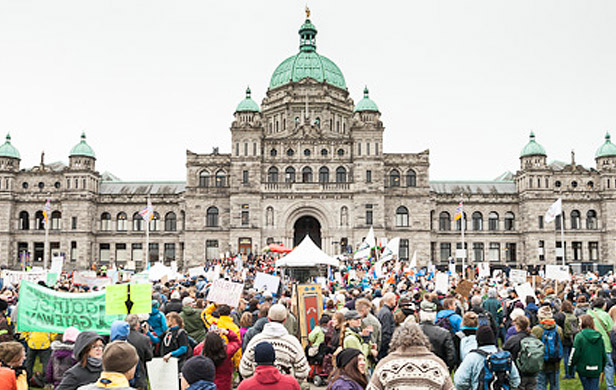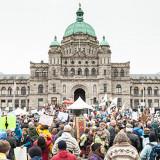
Just this morning, BC Premier Christy Clark and Alberta Premier Allison Redford have announced that they have penned a deal to ram a pipeline from Northern Alberta’s oil sands fields to the West Coast. And according to news reports, there is “tentative” support for other pipelines.
In Canada we are at a major cross-roads, with some big government leaders pushing pipelines that will lock the country permanently into the “petro-state” column, while at the same time scientists, environmental experts and economists saying that we are lighting a “carbon bomb” for the long term.
Politicians, like Stephen Harper, Justin Trudeau, Clark and Redford think building massive pipelines to the US and off our coasts to send unprocessed oil sands from Alberta to out-of-country export facilities is a wonderful idea.
 At the same time, scientists at esteemed scientific organizations like NASA, say that building Keystone and pumping more oil sands out of Alberta pretty much guarantees runaway climate change and atmospheric disruption.
At the same time, scientists at esteemed scientific organizations like NASA, say that building Keystone and pumping more oil sands out of Alberta pretty much guarantees runaway climate change and atmospheric disruption.On one hand, a political win and some short term payouts that will mainly go to foreign oil companies like ExxonMobil and PetroChina. On the other hand, extreme weather, droughts, wildfires and heat waves for generations to come.
Big bucks for foreign oil companies, drought and wildfires for Canadians! The choice is yours. Seems like a no-brainer to me. I think my kids deserve a safe and stable future.
Time to stand up.
On Nov. 16th, Canadians from coast-to-coast-to-coast will gather at events to voice their opposition to the direction politicians like Stephen Harper want to take our country.
Will you be there?
Vimeo video by Zack Embree


“… drought and wildfires for Canadians! …”
While carbon dioxide has been going up, wildfires have actually been going down. A paper showed a world-wide, century-long history of ever-decreasing global burned area. The study considered 1900-2007 (the time period that includes “Global Warming”) and it concluded that wildfires were going down.
If you look at the accumulated data for the USA, you’d see a downward trend:
http://www.nifc.gov/fireInfo/fireInfo_stats_totalFires.html
In a study of the western USA, wildfires there were the lowest in 3000 years.
Even the LA Times knows that:
LA Times: “Although 2013 was marked by two high-profile blazes, one in California and the other in Arizona, nationally the total wildfire acreage, 4.15 million, is far below the 10-year average of 6.8 million acres.”
http://www.latimes.com/science/sciencenow/la-sci-sn-wildfire-season-2013-20131209-story.html
“…we developed a 0.5° × 0.5° data set of global burned area from 1901 to 2007 …”
“The average global burned area is ~442 × 104 km2 yr−1 during 1901–2007…”
“…a notable declining rate of burned area globally (1.28 × 104 km2 yr−1).
“… the declining trend of burned area in tropics and extratropics…”
http://onlinelibrary.wiley.com/doi/10.1002/2013JG002532/abstract
http://www.nifc.gov/fireInfo/fireInfo_stats_totalFires.html
The National Interagency Coordination Center at NIFC compiles annual wildland fire statistics for federal and state agencies. This information is provided through Situation Reports, which have been in use for several decades.
Number of wildfires in Canada are also on a declining trend over the past 40 years of global warming No significant change in total area burned over the past 40 years
http://www.ncdc.noaa.gov/paleo/impd/
Researchers determened that wildfire activity in the western US, over the past 3,000 years, is presently at the lowest levels of the entire 3,000 year record.
“Since the late 1800s , human activities and the ecological effects of recent high fire activity caused a large, abrupt decline in burning similar to the [Little Ice Age] fire decline. Consequently, there is now a forest “fire deficit” in the western United States attributable to the combined effects of human activities, ecological, and climate changes.”
Variations in western US wildfires over the past 3,000 years. Horizontal axis is calendar years before the present.
http://www.pnas.org/content/early/2012/02/09/1112839109.abstract